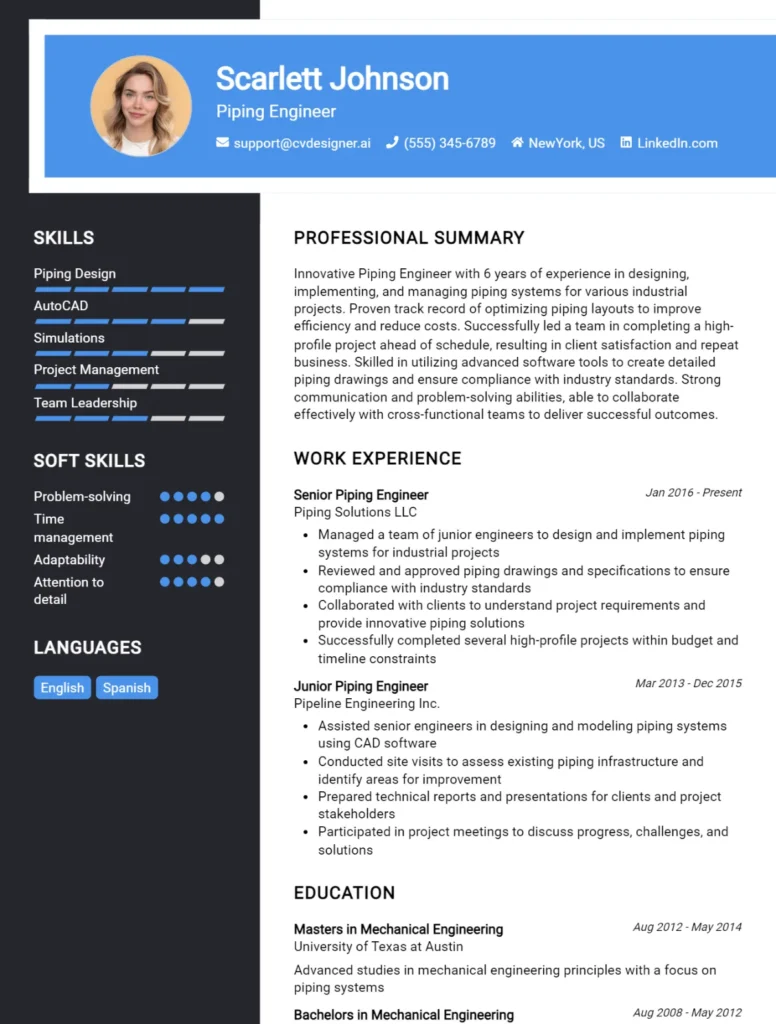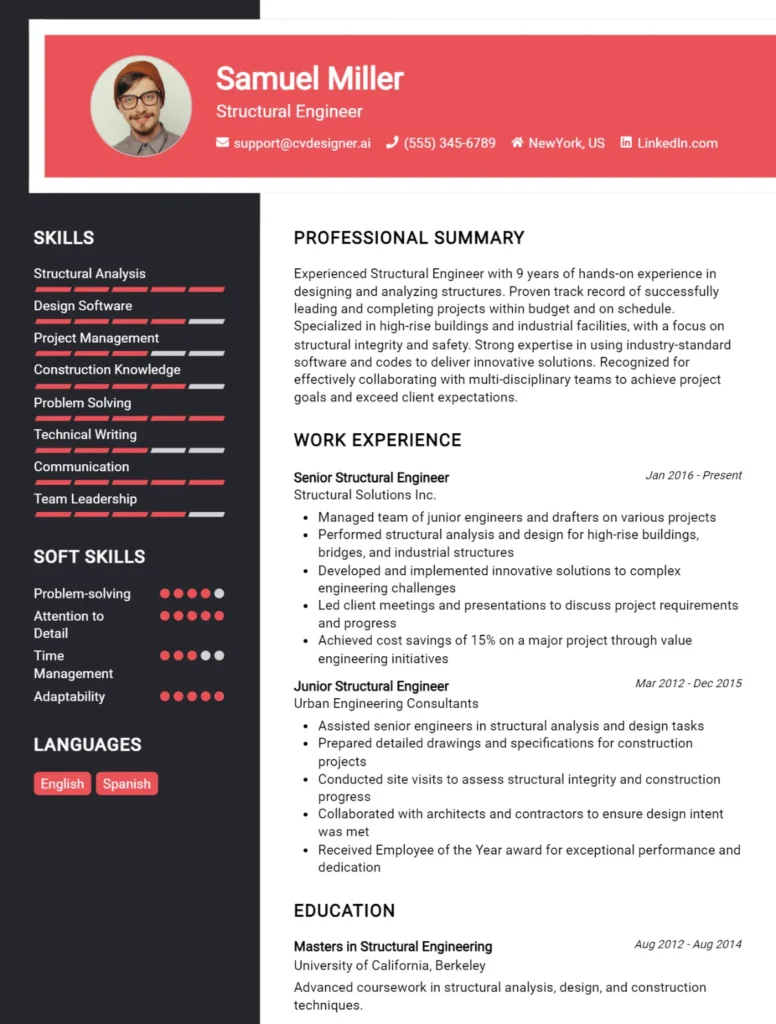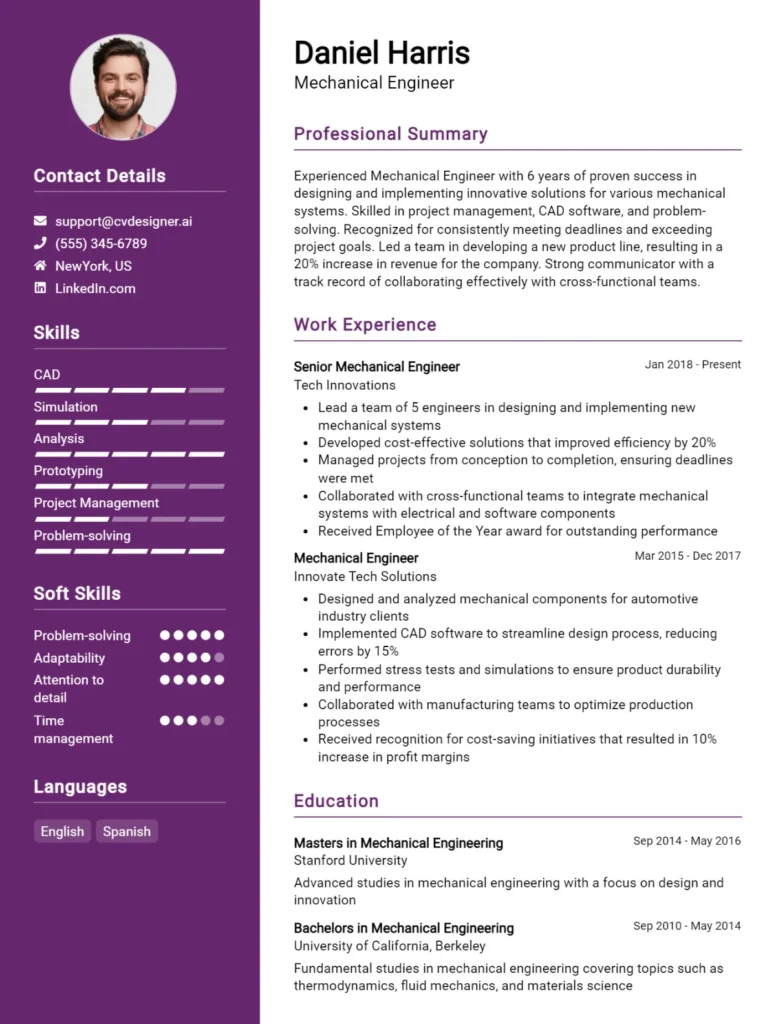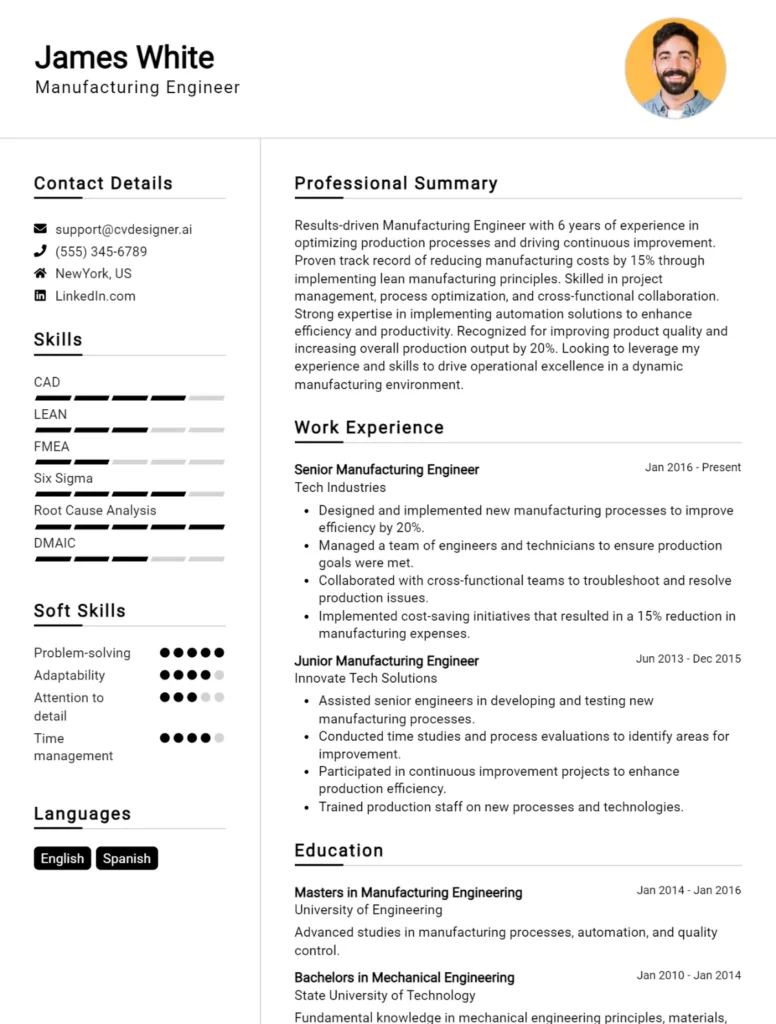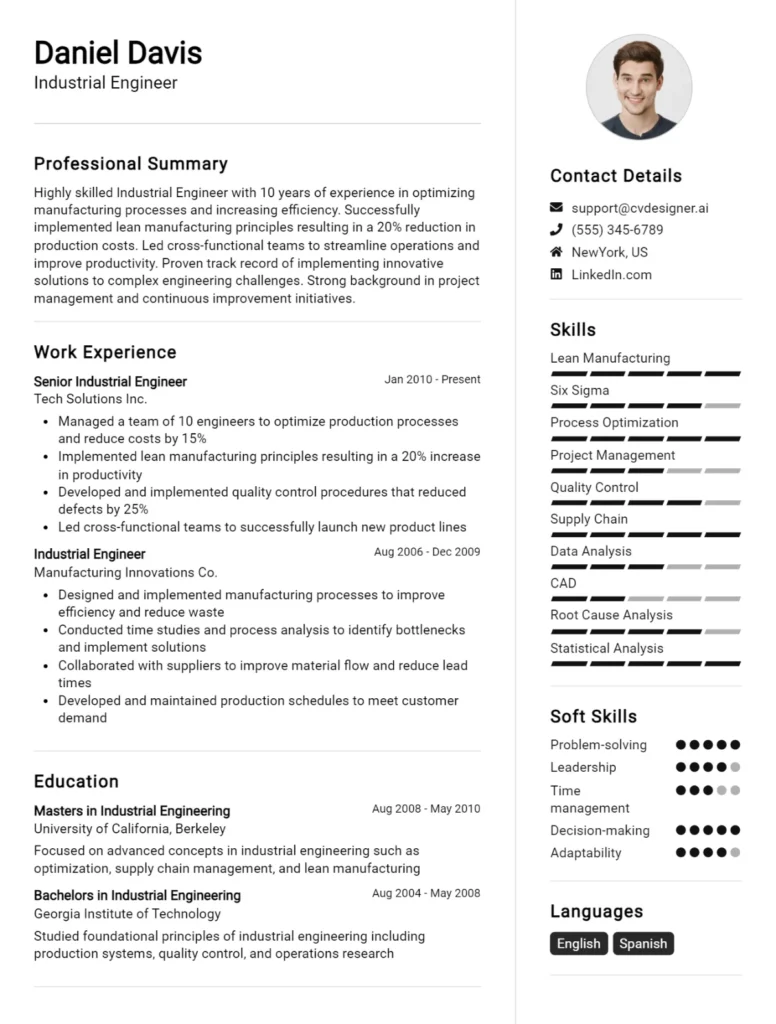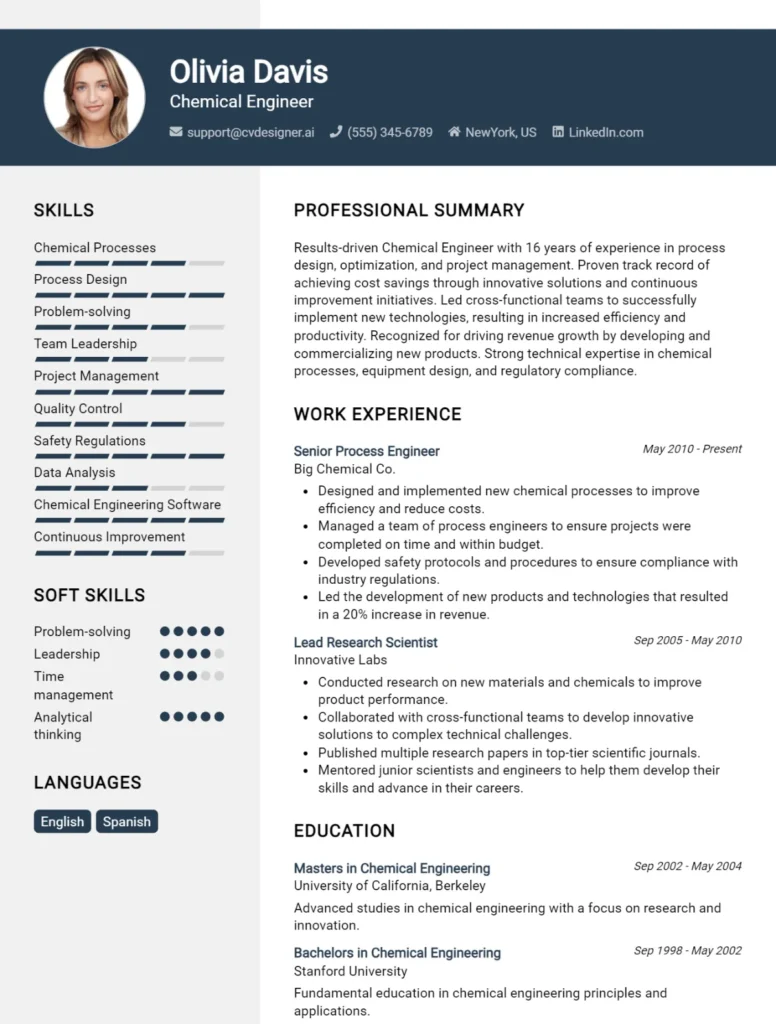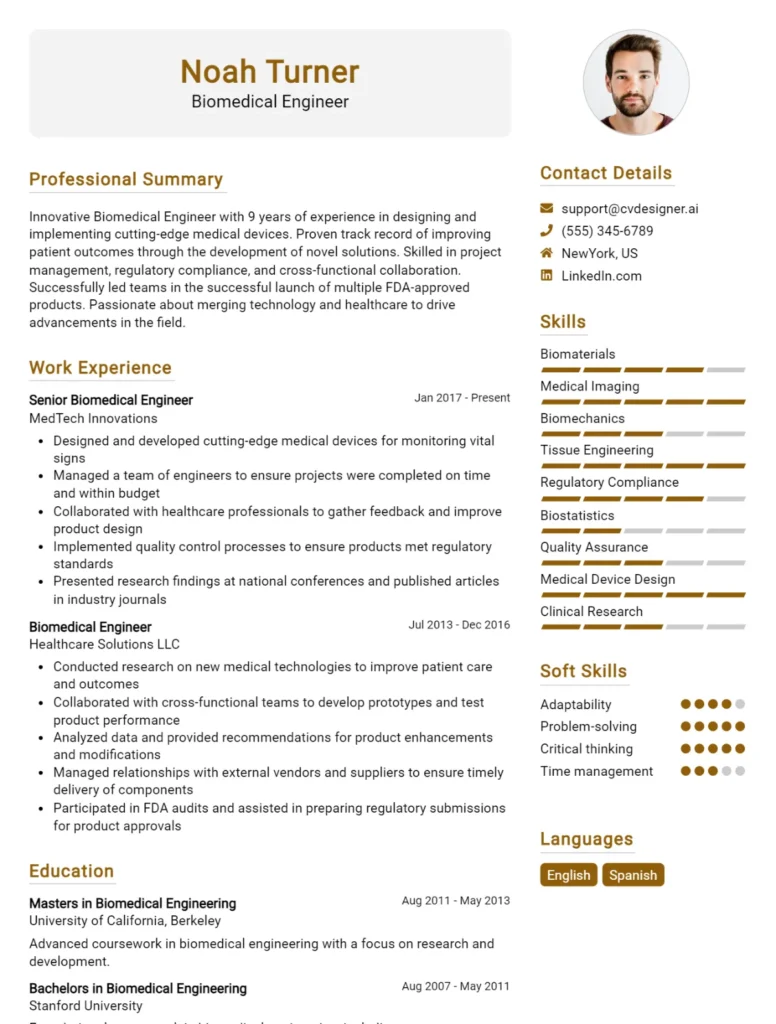Most Popular Electronics Engineer CV Examples
Explore additional Electronics Engineer CV samples and guides and see what works for your level of experience or role.
Are you passionate about all things electronics and technology? Do you have a knack for problem-solving and innovation? If so, a career as an Electronics Engineer may be the perfect fit for you. In this comprehensive guide, we will delve into the world of Electronics Engineer CV writing, providing you with valuable tips and tricks to help you land your dream job. From highlighting your technical skills to showcasing your project experience, we've got you covered. So, whether you're a seasoned professional looking to update your CV or a recent graduate entering the job market, this guide is essential for anyone looking to make a lasting impression in the field of electronics engineering.
Key points covered in this article:
- Crafting a compelling summary statement
- Showcasing your technical skills and certifications
- Highlighting your project experience
- Emphasizing your problem-solving abilities
- Formatting and organizing your CV effectively
What is a Electronics Engineer CV?
A Electronics Engineer CV is a crucial document that showcases the skills, experience, and qualifications of a professional in the field of electronics engineering. It serves as a comprehensive summary of an engineer's education, work history, projects, and technical expertise. A well-written CV can help a Electronics Engineer stand out among other candidates when applying for jobs or seeking career advancement opportunities.
In the competitive field of electronics engineering, a strong CV is essential for highlighting the unique strengths and achievements of a professional. It not only provides a snapshot of the engineer's background and capabilities but also demonstrates their ability to communicate effectively and present information in a clear and organized manner. By following a CV writing guide, Electronics Engineers can create a compelling document that effectively showcases their qualifications and makes a strong impression on potential employers.
Key Components of a Electronics Engineer CV
- Skills section highlighting technical skills such as circuit design, PCB layout, and troubleshooting
- Work experience detailing relevant projects and responsibilities in the electronics field
- Education section listing degrees and certifications related to electronics engineering
- Professional certifications or licenses, such as Professional Engineer (PE) certification
- Publications or research projects related to electronics engineering
- Awards or recognition for achievements in the field
- Technical proficiencies in software tools such as Altium, Cadence, or MATLAB
- Languages spoken or proficiency in any additional languages
- Professional affiliations with organizations like IEEE or IET
- Volunteer experience or involvement in community projects related to electronics
- Continuing education or professional development courses
- References from colleagues or supervisors in the electronics industry
Sample Electronics Engineer CV for Inspiration
[Full Name] [Address] [City, State, ZIP Code] [Phone Number] [Email Address]
Professional Summary: Electronics Engineer with over 5 years of experience in designing, developing, and testing electronic systems. Skilled in circuit design, PCB layout, and troubleshooting. Proven track record of delivering projects on time and within budget. Strong analytical and problem-solving skills.
Work Experience: Senior Electronics Engineer ABC Company, City, State June 2017 - Present
- Led a team of engineers in the design and development of a new electronic product
- Designed and implemented PCB layouts for various electronic systems
- Conducted testing and troubleshooting of electronic components
- Collaborated with cross-functional teams to ensure project success
Electronics Engineer XYZ Company, City, State January 2015 - May 2017
- Designed and optimized electronic circuits for consumer electronics products
- Conducted performance testing and analysis of electronic systems
- Worked closely with suppliers to source electronic components
- Assisted in the development of product documentation and user manuals
Education: Bachelor of Science in Electrical Engineering University of XYZ, City, State Graduated May 2014
Skills:
- Proficient in circuit design and PCB layout
- Strong knowledge of analog and digital electronics
- Experience with CAD software for electronic design
- Excellent communication and teamwork skills
- Ability to work under pressure and meet deadlines
Publications:
- "Advancements in Electronic System Design", Journal of Electronics Engineering, 2016
Certifications:
- Certified Electronics Engineer (CEng)
- Certified PCB Design Professional (PCBDP)
References available upon request.
Electronics Engineer CV Writing Tips
When writing a CV for a Electronics Engineer position, be sure to highlight your technical skills and experience in electronics design, testing, and troubleshooting. Tailor your CV to showcase your relevant experience in the field and emphasize any certifications or specialized training you have. Be specific about your accomplishments and use quantifiable metrics to demonstrate your impact in previous roles. Here are 6 specific tips to help you craft a strong Electronics Engineer CV:
- Start with a strong summary or objective statement that highlights your expertise in electronics engineering.
- Include relevant keywords and technical terms that are specific to the electronics industry to help your CV stand out to hiring managers.
- List your educational background, including any relevant degrees, certifications, or training programs you have completed.
- Highlight any hands-on experience you have with electronic components, circuits, and systems.
- Showcase any projects you have worked on that demonstrate your problem-solving skills and technical proficiency.
- Include any relevant software or programming languages you are proficient in, such as CAD software or programming languages like C++ or Python.
- Provide details about any internships or work experience you have in the electronics field, including the specific tasks and responsibilities you had.
- Proofread your CV carefully to ensure there are no typos or grammatical errors, as attention to detail is essential in the electronics engineering field.
Electronics Engineer CV Summary Examples
As an Electronics Engineer, I bring a strong background in designing, developing, and testing electronic systems. With a keen eye for detail and a passion for innovation, I am dedicated to delivering high-quality solutions that meet the needs of clients and exceed expectations. Here are some examples of effective CV summaries for an Electronics Engineer:
- Experienced Electronics Engineer with a proven track record of successfully leading projects from conception to completion. Skilled in circuit design, PCB layout, and troubleshooting, I am adept at identifying and solving complex technical issues to deliver cutting-edge solutions.
- Results-driven Electronics Engineer with a solid foundation in analog and digital electronics. Proficient in using CAD software and simulation tools, I have a knack for optimizing designs for performance and cost-efficiency. I thrive in fast-paced environments and excel at collaborating with cross-functional teams.
- Detail-oriented Electronics Engineer with a deep understanding of electromagnetic theory and signal processing. Specializing in RF and microwave systems, I have a knack for designing high-frequency circuits and antennas that meet stringent performance requirements. My strong analytical and problem-solving skills make me a valuable asset to any engineering team.
- Dynamic Electronics Engineer with a passion for staying at the forefront of emerging technologies. Experienced in embedded systems development and firmware programming, I have a proven ability to deliver innovative solutions that drive business growth. With a strong focus on continuous learning and professional development, I am committed to staying ahead of the curve in the ever-evolving field of electronics engineering.
- Skilled Electronics Engineer with a diverse background in both hardware and software development. Proficient in programming languages such as C and Python, I have a talent for integrating software and hardware components to create seamless and efficient systems. With a strong commitment to quality and customer satisfaction, I am dedicated to delivering solutions that exceed expectations and drive business success.
Build a Strong Experience Section for Your Electronics Engineer CV
As an Electronics Engineer, my experience includes designing, developing, and testing electronic systems and components to ensure optimal performance. I have a strong background in troubleshooting and problem-solving complex electrical issues, as well as collaborating with cross-functional teams to deliver high-quality products. Below are examples of strong work experience descriptions for a Electronics Engineer:
- Led the design and implementation of a new circuit board layout, resulting in a 20% increase in efficiency and cost savings.
- Conducted thorough testing and analysis of electronic systems to identify and resolve issues, reducing downtime by 15%.
- Collaborated with software engineers to integrate firmware updates into electronic devices, improving overall functionality and user experience.
- Managed the production process of electronic components, ensuring compliance with industry standards and regulations.
- Developed and maintained documentation for electronic systems, including schematics, manuals, and test procedures.
- Mentored junior engineers in best practices for electronic design and troubleshooting techniques.
- Implemented quality control measures to ensure the reliability and durability of electronic products.
- Worked closely with suppliers and vendors to source high-quality components for electronic prototypes and production runs.
Electronics Engineer CV Education Examples
As an Electronics Engineer, having a strong educational background is crucial to success in the field. Here are a few examples of educational backgrounds that would be beneficial for a Electronics Engineer role:
- Bachelor's degree in Electrical Engineering: A degree in Electrical Engineering provides a solid foundation in electronics principles, circuits, and systems design, which are essential skills for an Electronics Engineer.
- Master's degree in Electronics Engineering: A more advanced degree in Electronics Engineering can provide specialized knowledge in areas such as digital signal processing, communication systems, and integrated circuit design.
- Associate's degree in Electronics Technology: This hands-on program can provide practical skills in electronics troubleshooting, repair, and maintenance, which are valuable for Electronics Engineers working in manufacturing or maintenance roles.
- Certification in Embedded Systems Design: This specialized certification can provide additional skills in programming microcontrollers, designing embedded systems, and working with sensors and actuators, which are becoming increasingly important in the field of electronics engineering.
Skills to Highlight in Your Electronics Engineer CV
As an Electronics Engineer, it is essential to showcase a unique blend of soft and hard skills on your CV to demonstrate your proficiency in designing, developing, and testing electronic systems. Soft skills such as problem-solving, teamwork, and attention to detail are crucial for effective project management and collaboration with cross-functional teams. On the other hand, hard skills like circuit design, programming, and PCB layout are vital for technical expertise in creating innovative electronic solutions. Below are 10 soft skills and 10 hard skills that you should highlight in your Electronics Engineer CV:
Soft Skills:
- Problem-solving
- Communication
- Time management
- Adaptability
- Teamwork
- Attention to detail
- Analytical thinking
- Creativity
- Leadership
- Conflict resolution
Hard Skills:
- Circuit design
- Analog and digital electronics
- Programming (C++, Verilog, VHDL)
- PCB layout
- Signal processing
- Power electronics
- Embedded systems
- RF engineering
- Testing and troubleshooting
- Project management
Electronics Engineer CV Format
As an Electronics Engineer, your CV format should showcase your technical skills and experience in the field. For entry-level positions, a chronological format highlighting relevant coursework and internships is ideal. For mid-level positions, a combination format emphasizing project management and leadership skills is recommended. For senior-level roles, a functional format focusing on accomplishments and industry recognition works best. Remember to tailor your CV to the specific job requirements and use clear, concise language to highlight your qualifications. Check out this article on cv format for more tips and examples.
- Start with a strong summary or objective statement
- Highlight your technical skills and certifications
- Include relevant work experience and projects
- Showcase your problem-solving and critical thinking abilities
- Mention any industry awards or recognition
- Use a clean and professional layout with easy-to-read fonts and consistent formatting
Common Mistakes to Avoid in a Electronics Engineer CV
When applying for a job as an Electronics Engineer, it is essential to have a well-crafted CV that highlights your skills and experiences in the field. However, there are common mistakes that many candidates make that can hinder their chances of landing the job. To ensure that your CV stands out to potential employers, avoid the following mistakes:
- Including irrelevant information that does not pertain to the job
- Failing to tailor the CV to the specific job requirements
- Using generic language and not showcasing technical skills
- Providing a lengthy and cluttered CV that is hard to read
- Not providing specific examples of projects or accomplishments
- Neglecting to include any relevant certifications or licenses
- Using unprofessional formatting or design
- Not proofreading for grammar and spelling errors
- Omitting contact information or failing to update it
- Failing to include a cover letter or personalized message for each application.
Key Takeaways for a Electronics Engineer CV
- Highlight your education and certifications relevant to electronics engineering.
- Showcase your technical skills such as circuit design, PCB layout, and troubleshooting.
- Include any relevant work experience, internships, or projects in the electronics field.
- Demonstrate your knowledge of software tools like CAD software, simulation tools, and programming languages.
- Mention any specialized training or courses you have completed in electronics engineering.
- Emphasize your ability to work in a team and communicate effectively with colleagues and clients.
- Include any publications, patents, or research projects related to electronics engineering.
- Customize your CV with a professional template from CV Templates to make it visually appealing.
- Use CV Builder to create a tailored CV that highlights your skills and experiences effectively.
- Consider adding a cover letter using templates from Cover Letter Templates to further showcase your interest in the position.
- Proofread your CV carefully to ensure it is error-free and presents you in the best possible light.
- Tailor your CV to each job application to highlight the most relevant skills and experiences for the role.
Build your CV in minutes
Use an AI-powered cv builder and have your cv done in 5 minutes. Just select your template and our software will guide you through the process.



